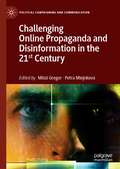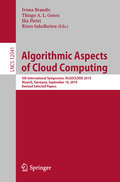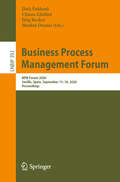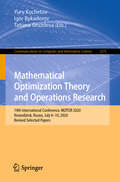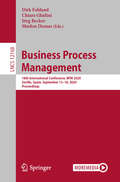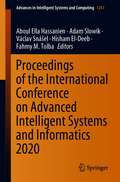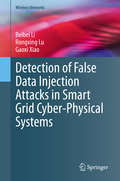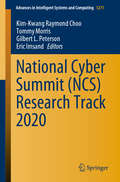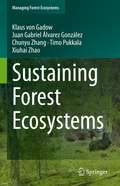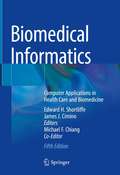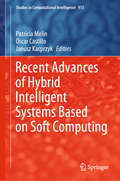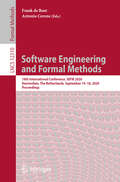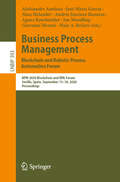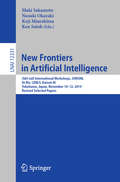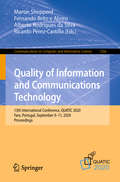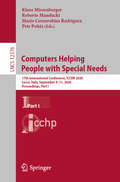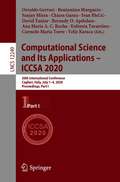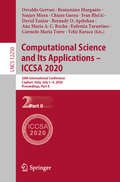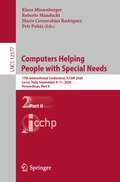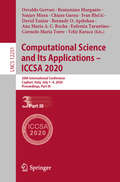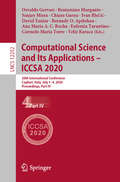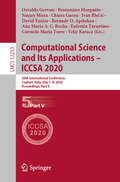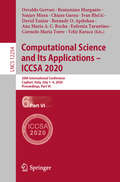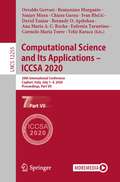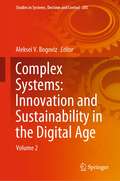- Table View
- List View
Challenging Online Propaganda and Disinformation in the 21st Century (Political Campaigning and Communication)
by Miloš Gregor Petra MlejnkováDisinformation has recently become a salient issue, not just for researchers but for the media, politicians, and the general public as well. Changing circumstances are a challenge for system and societal resilience; disinformation is also a challenge for governments, civil society, and individuals. Thus, this book focuses on the post-truth era and the online environment, which has changed both the ways and forms in which disinformation is presented and spread. The volume is dedicated to the complex processes of understanding the mechanisms and effects of online propaganda and disinformation, its detection and reactions to it in the European context. It focuses on questions and dilemmas from political science, security studies, IT, and law disciplines with the aim to protect society and build resilience against online propaganda and disinformation in the post-truth era.
Algorithmic Aspects of Cloud Computing: 5th International Symposium, ALGOCLOUD 2019, Munich, Germany, September 10, 2019, Revised Selected Papers (Lecture Notes in Computer Science #12041)
by Ivona Brandic Thiago A. L. Genez Ilia Pietri Rizos SakellariouThis book constitutes the refereed post-conference proceedings of the 5th International Symposium on Algorithmic Aspects of Cloud Computing, ALGOCLOUD 2019, held in Munich, Germany, in September 2019. The 8 revised full papers were carefully reviewed and selected from 16 submissions. The aim of the symposium is to present research activities and results on topics related to algorithmic, design, and development aspects of modern cloud-based systems.
Business Process Management Forum: BPM Forum 2020, Seville, Spain, September 13–18, 2020, Proceedings (Lecture Notes in Business Information Processing #392)
by Dirk Fahland Chiara Ghidini Jörg Becker Marlon DumasThis book constitutes the proceedings of the BPM Forum of the 18th International Conference on Business Process Management, BPM 2020, which was planned to take place in Seville, Spain, in September 2020. Due to the COVID-19 pandemic the conference took place virtually. The BPM Forum hosts innovative research which has a high potential of stimulating discussions. The papers selected for the forum are expected to showcase fresh ideas from exciting and emerging topics in BPM, even if they are not yet as mature as the regular papers at the conference. The 19 papers presented in this volume were carefully reviewed and selected from a total of 125 submissions to the main conference. They were organized in topical sections named: process modeling; process mining; predictions and recommendations; BPM adoption and maturity; and standardization, change, and handoffs.
Mathematical Optimization Theory and Operations Research: 19th International Conference, MOTOR 2020, Novosibirsk, Russia, July 6–10, 2020, Revised Selected Papers (Communications in Computer and Information Science #1275)
by Yury Kochetov Igor Bykadorov Tatiana GruzdevaThis book constitutes refereed proceedings of the 19th International Conference on Mathematical Optimization Theory and Operations Research, MOTOR 2020, held in July 2020. Due to the COVID-19 pandemic the conference was held online. The 25 full papers and 8 short papers presented in this volume were carefully reviewed and selected from a total of 102 submissions. The papers in the volume are organised according to the following topical headings: combinatorial optimization; mathematical programming; global optimization; game theory and mathematical economics; heuristics and metaheuristics; machine learning and data analysis.
Business Process Management: 18th International Conference, BPM 2020, Seville, Spain, September 13–18, 2020, Proceedings (Lecture Notes in Computer Science #12168)
by Dirk Fahland Chiara Ghidini Jörg Becker Marlon DumasThis book constitutes the proceedings of the 18th International Conference on Business Process Management, BPM 2020, held in Seville, Spain, in September 2020. The conference was held virtually due to the COVID-19 pandemic. The 27 full papers included in this volume were carefully reviewed and selected from 125 submissions. Two full keynote papers are also included. The papers are organized in topical sections named: foundations; engineering; and management.
Proceedings of the International Conference on Advanced Intelligent Systems and Informatics 2020 (Advances in Intelligent Systems and Computing #1261)
by Václav Snášel Aboul Ella Hassanien Fahmy M. Tolba Adam Slowik Hisham El-DeebThis book presents the proceedings of the 6th International Conference on Advanced Intelligent Systems and Informatics 2020 (AISI2020), which took place in Cairo, Egypt, from October 19 to 21, 2020. This international and interdisciplinary conference, which highlighted essential research and developments in the fields of informatics and intelligent systems, was organized by the Scientific Research Group in Egypt (SRGE). The book is divided into several sections, covering the following topics: Intelligent Systems, Deep Learning Technology, Document and Sentiment Analysis, Blockchain and Cyber Physical System, Health Informatics and AI against COVID-19, Data Mining, Power and Control Systems, Business Intelligence, Social Media and Digital Transformation, Robotic, Control Design, and Smart Systems.
Detection of False Data Injection Attacks in Smart Grid Cyber-Physical Systems (Wireless Networks)
by Beibei Li Rongxing Lu Gaoxi XiaoThis book discusses cybersecurity issues of smart grid cyber-physical systems, focusing on the detection techniques against false data injection attacks. The authors discuss passive and proactive techniques that combat and mitigate two categories of false data injection attacks, false measurement data injections and false command data injections in smart grid cyber-physical systems. These techniques are easy to follow for either professionals or beginners. With this book, readers can quickly get an overview of this topic and get ideas of new solutions for false data injections in smart grid cyber-physical systems. Readers include researchers, academics, students, and professionals.Presents a comprehensive summary for the detection techniques of false data injection attacks in smart grid cyber-physical systems; Reviews false data injections for either measurement data or command data; Analyzes passive and proactive approaches to smart grid cyber-physical systems.
National Cyber Summit (Advances in Intelligent Systems and Computing #1271)
by Kim-Kwang Raymond Choo Tommy Morris Gilbert L. Peterson Eric ImsandThis book presents findings from the papers accepted at the Cyber Security Education Stream and Cyber Security Technology Stream of The National Cyber Summit’s Research Track, reporting on the latest advances on topics ranging from software security to cyber attack detection and modelling to the use of machine learning in cyber security to legislation and policy to surveying of small businesses to cyber competition, and so on. Understanding the latest capabilities in cyber security ensures that users and organizations are best prepared for potential negative events. This book is of interest to cyber security researchers, educators, and practitioners, as well as students seeking to learn about cyber security.
Sustaining Forest Ecosystems (Managing Forest Ecosystems #37)
by Klaus von Gadow Juan Gabriel Álvarez González Chunyu Zhang Timo Pukkala Xiuhai ZhaoForest ecosystems include a great variety of communities of organisms interacting with their physical environment: multi-aged natural forests, even-aged monocultures, and secondary forests invaded by foreign species. The challenge is to sustain their ability to function, by adapting to changing climates and satisfying a multitude of human demands. Our first chapter sets the scene with a discussion about the effects of forest management on ecosystem services. Details about forest observational infrastructures are introduced in the second chapter. The third chapter presents methods of analysing forest density and structure. Models for estimating the shape and growth of individual forest trees are introduced in chapter 4, models of forest community production in Chapter 5. Methods and examples of sustainable forest design are covered in chapter 6. New scientific contributions continue to emerge as we are writing, and this work is never finished. We hope to continue with regular updates replacing obsolete sections with new ones, but the general aim remains the same, to introduce a range of methods that will assist those interested in sustaining forest ecosystems.
Biomedical Informatics: Computer Applications in Health Care and Biomedicine
by Michael F. ChiangThis 5th edition of this essential textbook continues to meet the growing demand of practitioners, researchers, educators, and students for a comprehensive introduction to key topics in biomedical informatics and the underlying scientific issues that sit at the intersection of biomedical science, patient care, public health and information technology (IT). Emphasizing the conceptual basis of the field rather than technical details, it provides the tools for study required for readers to comprehend, assess, and utilize biomedical informatics and health IT. It focuses on practical examples, a guide to additional literature, chapter summaries and a comprehensive glossary with concise definitions of recurring terms for self-study or classroom use.Biomedical Informatics: Computer Applications in Health Care and Biomedicine reflects the remarkable changes in both computing and health care that continue to occur and the exploding interest in the role that IT must play in care coordination and the melding of genomics with innovations in clinical practice and treatment. New and heavily revised chapters have been introduced on human-computer interaction, mHealth, personal health informatics and precision medicine, while the structure of the other chapters has undergone extensive revisions to reflect the developments in the area. The organization and philosophy remain unchanged, focusing on the science of information and knowledge management, and the role of computers and communications in modern biomedical research, health and health care.
Recent Advances of Hybrid Intelligent Systems Based on Soft Computing (Studies in Computational Intelligence #915)
by Patricia Melin Oscar Castillo Janusz KacprzykThis book describes recent advances on fuzzy logic, neural networks and optimization algorithms, as well as their hybrid combinations, and their application in areas such as intelligent control and robotics, pattern recognition, medical diagnosis, time series prediction and optimization of complex problems. The book contains a collection of papers focused on hybrid intelligent systems based on soft computing. There are some papers with the main theme of type-1 and type-2 fuzzy logic, which basically consists of papers that propose new concepts and algorithms based on type-1 and type-2 fuzzy logic and their applications. There are also some papers that present theory and practice of meta-heuristics in different areas of application. Another group of papers describes diverse applications of fuzzy logic, neural networks and hybrid intelligent systems in medical applications. There are also some papers that present theory and practice of neural networks in different areas of application. In addition, there are papers that present theory and practice of optimization and evolutionary algorithms in different areas of application. Finally, there are some papers describing applications of fuzzy logic, neural networks and meta-heuristics in pattern recognition problems.
Software Engineering and Formal Methods: 18th International Conference, SEFM 2020, Amsterdam, The Netherlands, September 14–18, 2020, Proceedings (Lecture Notes in Computer Science #12310)
by Frank De Boer Antonio CeroneThis book constitutes the refereed proceedings of the 18th International Conference on Software Engineering and Formal Methods, SEFM 2020, held in Amsterdam, The Netherlands, in September 2020.The 16 full papers presented together with 1 keynote talk and an abstract of a keynote talk were carefully reviewed and selected from 58 submissions. The papers cover a large variety of topics, including testing, formal verification, program analysis, runtime verification, meta-programming and software development and evolution. The papers address a wide range of systems, such as IoT systems, human-robot interaction in healthcare scenarios, navigation of maritime autonomous systems, and operating systems.The Chapters "Multi-Purpose Syntax Definition with SDF3", “FRed: Conditional Model Checking via Reducers and Folders" and "Difference Verification with Conditions” are available open access under a Creative Commons Attribution 4.0 International License via link.springer.com.
Business Process Management: BPM 2020 Blockchain and RPA Forum, Seville, Spain, September 13–18, 2020, Proceedings (Lecture Notes in Business Information Processing #393)
by Aleksandre Asatiani José María García Nina Helander Andrés Jiménez-Ramírez Agnes Koschmider Jan Mendling Giovanni Meroni Hajo A. ReijersThis book constitutes the proceedings of the Blockchain and Robotic Process Automation (RPA) Forum which was held as part of the 18th International Conference on Business Process Management, BPM 2020. The conference was planned to take place in Seville, Spain, in September 2020. Due to the COVID-19 pandemic the conference took place virtually.The Blockchain Forum and the RPA Forum have in common that they are centered around an emerging and exciting technology. The blockchain is a sophisticated distributed ledger technology, while RPA software allows for mimicking human, repetitive actions. Each of these have the potential to fundamentally change how business processes are being orchestrated and executed in practice. The BPM community has embraced these technologies as objects of analysis, design, development, and evaluation.The 14 full plus one short paper presented in this volume were carefully reviewed and selected from a total of 28 submissions.
New Frontiers in Artificial Intelligence: JSAI-isAI International Workshops, JURISIN, AI-Biz, LENLS, Kansei-AI, Yokohama, Japan, November 10–12, 2019, Revised Selected Papers (Lecture Notes in Computer Science #12331)
by Maki Sakamoto Naoaki Okazaki Koji Mineshima Ken SatohThis book constitutes extended, revised and selected papers from the 11th International Symposium of Artificial Intelligence supported by the Japanese Society for Artificial Intelligence, JSAI-isAI 2019. It was held in November 2019 in Yokohama, Japan.The 26 papers were carefully selected from 46 submissions and deal with topics of AI research and are organized into 4 sections, according to the 4 workshops: JURISIN 2019, AI-Biz 2019, LENLS 16, and Kansei-AI 2019.
Quality of Information and Communications Technology: 13th International Conference, QUATIC 2020, Faro, Portugal, September 9–11, 2020, Proceedings (Communications in Computer and Information Science #1266)
by Ricardo Pérez-Castillo Martin Shepperd Fernando Brito e Abreu Alberto Rodrigues da SilvaThis book constitutes the refereed proceedings of the 13th International Conference on the Quality of Information and Communications Technology, QUATIC 2020, held in Faro, Portugal*, in September 2020.The 27 full papers and 12 short papers were carefully reviewed and selected from 81 submissions. The papers are organized in topical sections: quality aspects in machine learning, AI and data analytics; evidence-based software quality engineering; human and artificial intelligences for software evolution; process modeling, improvement and assessment; software quality education and training; quality aspects in quantum computing; safety, security and privacy; ICT verification and validation; RE, MDD and agile.*The conference was held virtually due to the COVID-19 pandemic.
Computers Helping People with Special Needs: 17th International Conference, ICCHP 2020, Lecco, Italy, September 9–11, 2020, Proceedings, Part I (Lecture Notes in Computer Science #12376)
by Roberto Manduchi Klaus Miesenberger Mario Covarrubias Rodriguez Petr PeňázThe two-volume set LNCS 12376 and 12377 constitutes the refereed proceedings of the 17th International Conference on Computers Helping People with Special Needs, ICCHP 2020, held in Lecco, Italy, in September 2020. The conference was held virtually due to the COVID-19 pandemic.The 104 papers presented were carefully reviewed and selected from 206 submissions. Included also are 13 introductions. The papers are organized in the following topical sections: Part I: user centred design and user participation in inclusive R&D; artificial intelligence, accessible and assistive technologies; XR accessibility – learning from the past, addressing real user needs and the technical architecture for inclusive immersive environments; serious and fun games; large-scale web accessibility observatories; accessible and inclusive digital publishing; AT and accessibility for blind and low vision users; Art Karshmer lectures in access to mathematics, science and engineering; tactile graphics and models for blind people and recognition of shapes by touch; and environmental sensing technologies for visual impairment Part II: accessibility of non-verbal communication: making spatial information accessible to people with disabilities; cognitive disabilities and accessibility – pushing the boundaries of inclusion using digital technologies and accessible eLearning environments; ICT to support inclusive education – universal learning design (ULD); hearing systems and accessories for people with hearing loss; mobile health and mobile rehabilitation for people with disabilities: current state, challenges and opportunities; innovation and implementation in the area of independent mobility through digital technologies; how to improve interaction with a text input system; human movement analysis for the design and evaluation of interactive systems and assistive devices; and service and care provision in assistive environments10 chapters are available open access under a Creative Commons Attribution 4.0 International License via link.springer.com.
Computational Science and Its Applications – ICCSA 2020: 20th International Conference, Cagliari, Italy, July 1–4, 2020, Proceedings, Part I (Lecture Notes in Computer Science #12249)
by Osvaldo Gervasi Beniamino Murgante Sanjay Misra Ana Maria A. C. Rocha David Taniar Bernady O. Apduhan Eufemia Tarantino Chiara Garau Ivan Blečić Carmelo Maria Torre Yeliz KaracaThe seven volumes LNCS 12249-12255 constitute the refereed proceedings of the 20th International Conference on Computational Science and Its Applications, ICCSA 2020, held in Cagliari, Italy, in July 2020. Due to COVID-19 pandemic the conference was organized in an online event.Computational Science is the main pillar of most of the present research, industrial and commercial applications, and plays a unique role in exploiting ICT innovative technologies.The 466 full papers and 32 short papers presented were carefully reviewed and selected from 1450 submissions. Apart from the general track, ICCSA 2020 also include 52 workshops, in various areas of computational sciences, ranging from computational science technologies, to specific areas of computational sciences, such as software engineering, security, machine learning and artificial intelligence, blockchain technologies, and of applications in many fields.
Computational Science and Its Applications – ICCSA 2020: 20th International Conference, Cagliari, Italy, July 1–4, 2020, Proceedings, Part II (Lecture Notes in Computer Science #12250)
by Osvaldo Gervasi Beniamino Murgante Sanjay Misra Chiara Garau Ivan Blečić David Taniar Bernady O. Apduhan Ana Maria A. C. Rocha Eufemia Tarantino Carmelo Maria Torre Yeliz KaracaThe seven volumes LNCS 12249-12255 constitute the refereed proceedings of the 20th International Conference on Computational Science and Its Applications, ICCSA 2020, held in Cagliari, Italy, in July 2020. Due to COVID-19 pandemic the conference was organized in an online event.Computational Science is the main pillar of most of the present research, industrial and commercial applications, and plays a unique role in exploiting ICT innovative technologies.The 466 full papers and 32 short papers presented were carefully reviewed and selected from 1450 submissions. Apart from the general track, ICCSA 2020 also include 52 workshops, in various areas of computational sciences, ranging from computational science technologies, to specific areas of computational sciences, such as software engineering, security, machine learning and artificial intelligence, blockchain technologies, and of applications in many fields.
Computers Helping People with Special Needs: 17th International Conference, ICCHP 2020, Lecco, Italy, September 9–11, 2020, Proceedings, Part II (Lecture Notes in Computer Science #12377)
by Roberto Manduchi Klaus Miesenberger Mario Covarrubias Rodriguez Petr PeňázThe two-volume set LNCS 12376 and 12377 constitutes the refereed proceedings of the 17th International Conference on Computers Helping People with Special Needs, ICCHP 2020, held in Lecco, Italy, in September 2020. The conference was held virtually due to the COVID-19 pandemic. The 104 papers presented were carefully reviewed and selected from 206 submissions. Included also are 13 introductions. The papers are organized in the following topical sections: Part I: user centred design and user participation in inclusive R&D; artificial intelligence, accessible and assistive technologies; XR accessibility – learning from the past, addressing real user needs and the technical architecture for inclusive immersive environments; serious and fun games; large-scale web accessibility observatories; accessible and inclusive digital publishing; AT and accessibility for blind and low vision users; Art Karshmer lectures in access to mathematics, science and engineering; tactile graphics and models for blind people and recognition of shapes by touch; and environmental sensing technologies for visual impairment Part II: accessibility of non-verbal communication: making spatial information accessible to people with disabilities; cognitive disabilities and accessibility – pushing the boundaries of inclusion using digital technologies and accessible eLearning environments; ICT to support inclusive education – universal learning design (ULD); hearing systems and accessories for people with hearing loss; mobile health and mobile rehabilitation for people with disabilities: current state, challenges and opportunities; innovation and implementation in the area of independent mobility through digital technologies; how to improve interaction with a text input system; human movement analysis for the design and evaluation of interactive systems and assistive devices; and service and care provision in assistive environments 12 chapters are available open access under a Creative Commons Attribution 4.0 International License via link.springer.com.
Computational Science and Its Applications – ICCSA 2020: 20th International Conference, Cagliari, Italy, July 1–4, 2020, Proceedings, Part III (Lecture Notes in Computer Science #12251)
by Osvaldo Gervasi Beniamino Murgante Sanjay Misra Chiara Garau Ivan Blečić David Taniar Bernady O. Apduhan Ana Maria A. C. Rocha Eufemia Tarantino Carmelo Maria Torre Yeliz KaracaThe seven volumes LNCS 12249-12255 constitute the refereed proceedings of the 20th International Conference on Computational Science and Its Applications, ICCSA 2020, held in Cagliari, Italy, in July 2020. Due to COVID-19 pandemic the conference was organized in an online event.Computational Science is the main pillar of most of the present research, industrial and commercial applications, and plays a unique role in exploiting ICT innovative technologies.The 466 full papers and 32 short papers presented were carefully reviewed and selected from 1450 submissions. Apart from the general track, ICCSA 2020 also include 52 workshops, in various areas of computational sciences, ranging from computational science technologies, to specific areas of computational sciences, such as software engineering, security, machine learning and artificial intelligence, blockchain technologies, and of applications in many fields.
Computational Science and Its Applications – ICCSA 2020: 20th International Conference, Cagliari, Italy, July 1–4, 2020, Proceedings, Part IV (Lecture Notes in Computer Science #12252)
by Osvaldo Gervasi Beniamino Murgante Sanjay Misra Chiara Garau Ivan Blečić David Taniar Bernady O. Apduhan Ana Maria A. C. Rocha Eufemia Tarantino Carmelo Maria Torre Yeliz KaracaThe seven volumes LNCS 12249-12255 constitute the refereed proceedings of the 20th International Conference on Computational Science and Its Applications, ICCSA 2020, held in Cagliari, Italy, in July 2020. Due to COVID-19 pandemic the conference was organized in an online event.Computational Science is the main pillar of most of the present research, industrial and commercial applications, and plays a unique role in exploiting ICT innovative technologies.The 466 full papers and 32 short papers presented were carefully reviewed and selected from 1450 submissions. Apart from the general track, ICCSA 2020 also include 52 workshops, in various areas of computational sciences, ranging from computational science technologies, to specific areas of computational sciences, such as software engineering, security, machine learning and artificial intelligence, blockchain technologies, and of applications in many fields.
Computational Science and Its Applications – ICCSA 2020: 20th International Conference, Cagliari, Italy, July 1–4, 2020, Proceedings, Part V (Lecture Notes in Computer Science #12253)
by Osvaldo Gervasi Beniamino Murgante Sanjay Misra Ana Maria A. C. Rocha David Taniar Bernady O. Apduhan Eufemia Tarantino Chiara Garau Ivan Blečić Carmelo Maria Torre Yeliz KaracaThe seven volumes LNCS 12249-12255 constitute the refereed proceedings of the 20th International Conference on Computational Science and Its Applications, ICCSA 2020, held in Cagliari, Italy, in July 2020. Due to COVID-19 pandemic the conference was organized in an online event.Computational Science is the main pillar of most of the present research, industrial and commercial applications, and plays a unique role in exploiting ICT innovative technologies.The 466 full papers and 32 short papers presented were carefully reviewed and selected from 1450 submissions. Apart from the general track, ICCSA 2020 also include 52 workshops, in various areas of computational sciences, ranging from computational science technologies, to specific areas of computational sciences, such as software engineering, security, machine learning and artificial intelligence, blockchain technologies, and of applications in many fields.
Computational Science and Its Applications – ICCSA 2020: 20th International Conference, Cagliari, Italy, July 1–4, 2020, Proceedings, Part VI (Lecture Notes in Computer Science #12254)
by Osvaldo Gervasi Beniamino Murgante Sanjay Misra Chiara Garau Ivan Blečić David Taniar Bernady O. Apduhan Ana Maria A. C. Rocha Eufemia Tarantino Carmelo Maria Torre Yeliz KaracaThe seven volumes LNCS 12249-12255 constitute the refereed proceedings of the 20th International Conference on Computational Science and Its Applications, ICCSA 2020, held in Cagliari, Italy, in July 2020. Due to COVID-19 pandemic the conference was organized in an online event.Computational Science is the main pillar of most of the present research, industrial and commercial applications, and plays a unique role in exploiting ICT innovative technologies.The 466 full papers and 32 short papers presented were carefully reviewed and selected from 1450 submissions. Apart from the general track, ICCSA 2020 also include 52 workshops, in various areas of computational sciences, ranging from computational science technologies, to specific areas of computational sciences, such as software engineering, security, machine learning and artificial intelligence, blockchain technologies, and of applications in many fields.
Computational Science and Its Applications – ICCSA 2020: 20th International Conference, Cagliari, Italy, July 1–4, 2020, Proceedings, Part VII (Lecture Notes in Computer Science #12255)
by Osvaldo Gervasi Beniamino Murgante Sanjay Misra Ana Maria A. C. Rocha David Taniar Bernady O. Apduhan Eufemia Tarantino Chiara Garau Ivan Blečić Carmelo Maria Torre Yeliz KaracaThe seven volumes LNCS 12249-12255 constitute the refereed proceedings of the 20th International Conference on Computational Science and Its Applications, ICCSA 2020, held in Cagliari, Italy, in July 2020. Due to COVID-19 pandemic the conference was organized in an online event.Computational Science is the main pillar of most of the present research, industrial and commercial applications, and plays a unique role in exploiting ICT innovative technologies.The 466 full papers and 32 short papers presented were carefully reviewed and selected from 1450 submissions. Apart from the general track, ICCSA 2020 also include 52 workshops, in various areas of computational sciences, ranging from computational science technologies, to specific areas of computational sciences, such as software engineering, security, machine learning and artificial intelligence, blockchain technologies, and of applications in many fields.
Complex Systems: Volume 2 (Studies in Systems, Decision and Control #283)
by Aleksei V. BogovizThis book provides a coherent framework for understanding the essence of complex systems and the nature of digital transformations, analyzes challenges of and patterns in innovative development, and shares a wealth of insights and best practices, resulting in the most extensive coverage of the topic available.In particular, the book’s cutting-edge contributions, prepared by scientists, engineers, and field experts,focus on the design, implementation, and evaluation of practical interventions that promote the innovative and sustainable development of complex systems. In addition to sharing a rich collection of cases from around the world, they provide a broad interdisciplinary analysis of collaboration mechanisms, theories and approaches to support and accelerate the development of complex systems.
